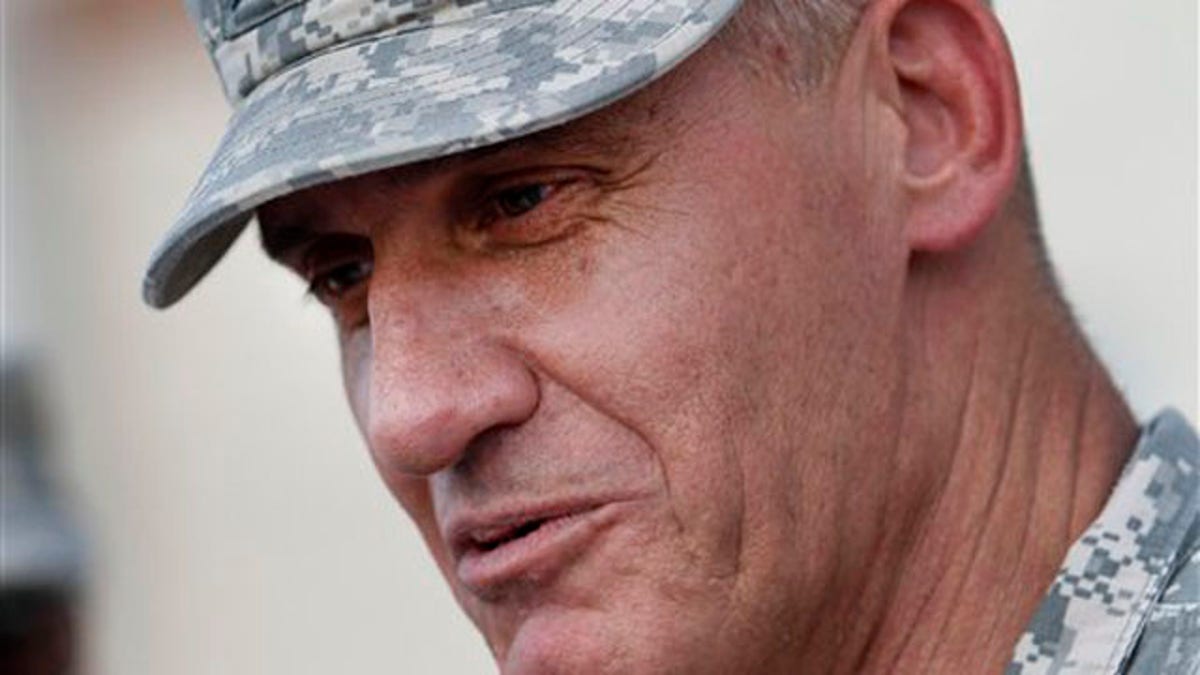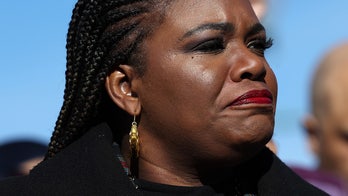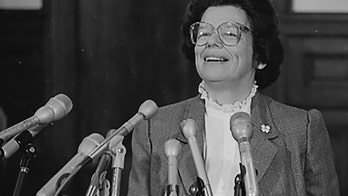
Gen. David M. Rodriguez, Commander of United State Army Forces Command speaks during a news conference after his assumption of command ceremony at Fort Bragg, N.C., Monday, Sept. 12, 2011. (AP)
As the war in Afghanistan winds down, the U.S. soldiers will be spread thinner and must be ready to perform a wider array of missions., the new Army commander in charge of training and providing troops for the wars said Monday.
Gen. David Rodriguez, who took over as head of U.S. Army Forces Command on Monday, said that as troops withdraw from Afghanistan, one brigade may have to take over where two have been working. And he said they must be trained to coordinate and use the high-tech surveillance, communications, and command and control systems that are flooding into the war zone.
"I don't think we can afford to have a bunch of tailored forces for different things," Rodriguez said in an interview with The Associated Press just before he took over his new command. "That's why we're going to have to be able to operate across the full spectrum of conflict and use the tools and apply them in the right way."
A veteran of more than 40 months in Afghanistan over the past 4 1/2 years, Rodriguez takes over Forces Command as the Army faces a difficult future. The Obama administration and a fractious Congress are wrangling over hundreds of millions of dollars in cuts to the Pentagon budget that could slash programs and force deeper reductions in the size of the armed forces.
Already the Army is set to cut nearly 50,000 soldiers by 2016, trimming the force back to about 520,000.
U.S. Army Forces Command, newly located at Fort Bragg, is the largest Army command and is responsible for training and preparing soldiers for battle, with deployments to more than 30 nations, including Iraq and Afghanistan.
Looking into the future, Rodriguez said he needs to be able to provide the trained and ready forces that commanders at the warfront need to meet a diverse threat.
The Army of tomorrow, he said, will have to be more flexible and adapt to many situations, from conventional warfare and deadly counterinsurgency campaigns to training missions that can help an emerging nation learn to protect itself.
Any future enemy will launch a hybrid attack that could involve a host of tactics, including chemical warfare, car bombs and cyberattacks. And the Army's leaders, he said, will have to adjust and "switch between high tempo offensive operations to a defensive operation to a stability operation to a humanitarian operation."
As Rodriguez assumed his new command, just a few blocks away about 200 82nd Airborne soldiers, weighted down with packs, were saying emotional goodbyes to their families and boarding buses to the airfield, where they would begin their flight to Afghanistan.
Speaking at Rodriguez' assumption of command ceremony, Gen. Ray Odierno, chief of staff of the Army, said that in this time of uncertainty, the U.S. must continue to field the best equipped, best trained and best led force. Odierno said he will be looking to Rodriguez and Forces Command to "move the Army forward" and lead it into the future.
Soldiers today must be trained not only on how to use their weapons and conduct operations, but they must also master an ever-expanding array of high-tech intelligence, surveillance, communications and other equipment. That will be particularly important, Rodriguez said, as forces shift to the hotly contested eastern border region of Afghanistan, where the rugged terrain and often isolated tribal communities force a greater reliance on long-range observation, a stronger link between manned and unmanned surveillance equipment and dependence on a fragile human intelligence network.
"In my first 20 years in the Army we probably got about 20-30 new systems," Rodriguez said.
"In 15 months (in Afghanistan) when I was a division commander I got 172 new ones."
Rodriguez, who was second in command in Afghanistan, is a 1976 graduate of the U.S. Military Academy. In addition to holding commands at all levels, he also served as the senior military assistant to then-Defense Secretary Robert Gates.




